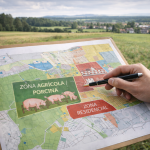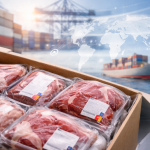Organized by the Danish Agriculture and Food Council and the Danish Embassy in Chile, a trade mission visited Santiago in January to meet with Chilean pork producers.
The Danish delegation was made up of member companies of the Food Cluster and focused on sustainability and innovation. The solutions presented by Breeders of Denmark, Danish Genetics Partner, DSI Dantech, FCSI, Hexa-Cover, and JS Proputec were well received by Chilean representatives, who are always looking to improve their processes and products.
The Danish Agriculture and Food Council (DAFC) represents Denmark’s agricultural and food industry, covering a wide range of sectors related to the export of agricultural products and equipment. One of DAFC’s strategic goals is to promote innovation, sustainability, and competitiveness in Danish agribusiness.
The meeting with the Chilean pork industry is part of an ongoing effort to strengthen business ties and share knowledge, focusing on sustainable solutions and advanced technologies for the meat and pork industry.
Chilean companies’ interest in Danish technologies is not new. Recognized for its leadership in sustainability and pork production, Denmark offers attractive solutions and technologies for the Chilean market.
Based on its own production and commercial challenges, Denmark sees the internationalization of its technologies and products as a sustainable growth strategy for its agri-food sector. The aim of the trade mission was to open the way for local companies to access key technologies for the development of the Chilean agri-food industry.
“This visit gave Danish companies the opportunity to meet our partners and showcase their products and services, while gaining first-hand knowledge of the local pork industry, its goals and challenges. The mission demonstrates the growing interest in sustainable and technologically advanced solutions for agriculture and livestock,” said Daniela Álvarez, ChileCarne’s Sustainability Manager.
The meeting not only consolidates Chilean-Danish collaboration, but also catalyzes future initiatives and business agreements, marking an important chapter in the development of both countries’ agroindustry.






